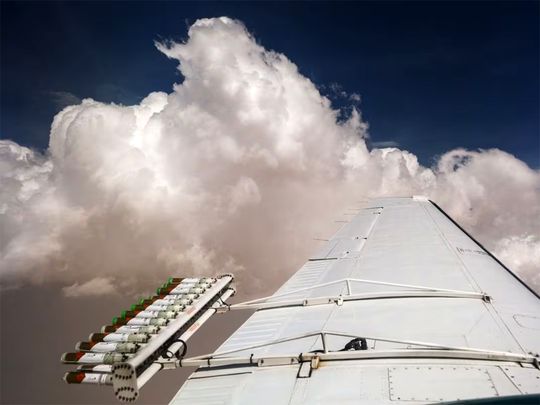
Our planet stands at a critical juncture in climate action. While institutions and governments collaborate on reversal methods and alternative energy, organisations worldwide explore intricate weather management to combat climate challenges. Water scarcity, exacerbated by climate change, population growth, and economic expansion, looms large.
The UAE, with less than 100mm of rainfall annually, faces water scarcity. The UAE Research Program for Rain Enhancement Science (UAEREP) focuses on rain enhancement, a key contributor to water security. Our commitment to responsible innovation and global prosperity drives unique partnerships, emphasising knowledge transfer.
The Fifth Cycle Grant Awards Ceremony, under the patronage of His Highness Sheikh Mansour bin Zayed Al Nahyan, underscored collaborative scientific initiatives addressing challenges. Rain enhancement science, including laser-based rain triggering and cloud seeding studies, offers a promising path to mitigate water stress.
Projected global freshwater deficit exceeds 3,200 cubic kilometres/year by 2050. Urgency demands clear, efficient solutions. Water scarcity affects everyone, transcending borders.
Our goal is to contribute to water security globally, advancing rain enhancement science. Integrating global resources is crucial for a holistic approach. Rain enhancement not only addresses water scarcity but enhances water quality, offering a comprehensive solution to the global water crisis.
Collaboration among scientists globally fosters breakthroughs, emphasising the impact of diverse minds uniting for a singular purpose. In the face of climate change, open collaboration becomes essential.
UAEREP has collaborated with over 3,700 stakeholders and engaged 2,220 researchers across 85+ countries. Partnerships include global organisations like WMO, Nasa, NCAR, Finnish Meteorological Institute, Meteorological Research Institute in Japan, and Hail Suppression Research Center in Russia.
UAEREP stands as a beacon of diplomatic and scientific synergy, transcending political differences. It demonstrates that knowledge pursuit is a universal language.
Addressing climate change is a collective responsibility. By investing in science and technology, we strive to collaboratively address global challenges. This project exemplifies dedication to responsible and impactful innovation.
Looking beyond current challenges, our vision is for long-term collaborative progress. Celebrating collaborative achievements calls for nations to recognise interconnected destinies. In the face of global challenges, collaboration and unity in science pave the way for a brighter, sustainable future.
Dr Abdulla Al Mandous is the Director-General of the National Center of Meteorology (NCM) and President of the World Meteorological Organization (WMO)






_resources1_16a45059ca3_small.jpg)

